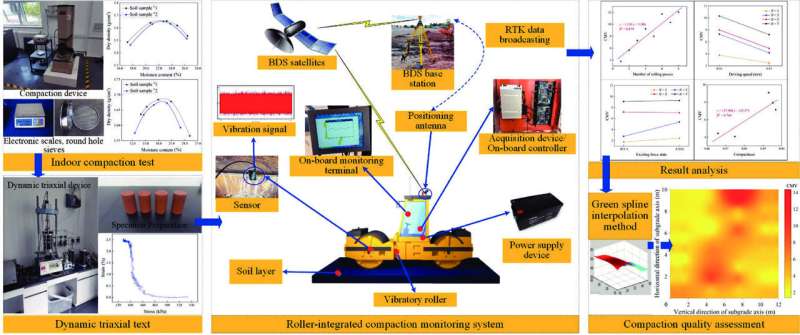
Highway construction often faces challenges in ensuring long-term subgrade performance due to traditional compaction quality control (QC) methods that rely on manual adjustments and sporadic testing. These methods are susceptible to human error, inefficiency, and incomplete assessments.
Addressing these issues requires advanced, real-time monitoring systems. Such systems can provide comprehensive and accurate QC, highlighting the need for innovative technologies to improve highway construction standards.
Researchers from the University of Science and Technology Beijing, alongside partners from Hunan and China Renewable Energy Engineering Institute, have published a study in the Journal of Intelligent Construction.
The study explores using roller-integrated compaction monitoring (RICM) technology combined with real-time kinematic-Beidou navigation satellite system (RTK-BDS) to enhance compaction quality assessment in highway subgrades. Tested on the Hengyong Highway Project, this innovative approach offers new insights into improving highway construction standards.
The study utilized RICM technology to monitor compaction meter value (CMV) and compaction power per unit volume (E) as real-time indexes for assessing highway subgrade compaction quality. The Hengyong Highway Project case study demonstrated CMV's reliability as a compaction quality indicator, showing a strong correlation with compactness.
Integrating RTK-BDS enabled precise real-time monitoring, providing a comprehensive evaluation of the construction area. The Green spline interpolation method further enhanced rapid assessment capability, ensuring swift and uninterrupted evaluations. The results highlighted CMV's superior data stability and lower dispersion compared to other methods, ensuring consistent and high-quality compaction. This innovative approach significantly improves QC in highway construction, preventing defects and enhancing overall highway durability and performance.
A.P. Qinglong Zhang from the University of Science and Technology Beijing stated, "The adoption of RICM technology in combination with RTK-BDS represents a significant advancement in highway construction. This method not only provides real-time, accurate data but also ensures a higher standard of compaction quality, ultimately leading to safer and more durable highways."
The proposed compaction quality assessment method has broad implications for the construction industry. By enabling real-time, comprehensive monitoring, it ensures higher construction quality standards and reduces the risk of defects. This approach can be adapted to various construction projects, enhancing overall infrastructure reliability and safety. The findings pave the way for further research and development in automated, real-time monitoring systems for construction quality control.
More information: Yuchen Yan et al, Roller-integrated compaction monitoring and assessment of high and low liquid limit silt subgrades using the Green spline interpolation algorithm, Journal of Intelligent Construction (2024). DOI: 10.26599/JIC.2024.9180024
Provided by Tsinghua University Press
Citation: Intelligent compaction: Ensuring highway durability with advanced monitoring (2024, July 24) retrieved 24 July 2024 from https://techxplore.com/news/2024-07-intelligent-compaction-highway-durability-advanced.html
This document is subject to copyright. Apart from any fair dealing for the purpose of private study or research, no part may be reproduced without the written permission. The content is provided for information purposes only.
